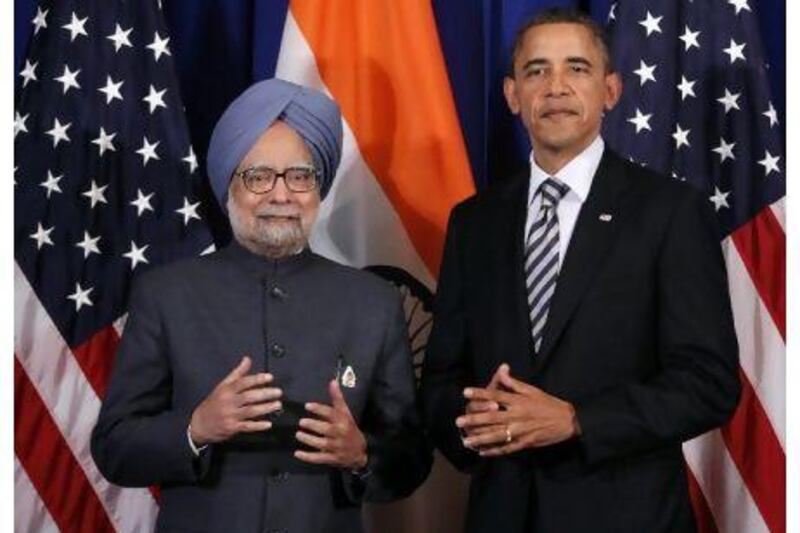NEW DELHI // The Indian prime minister, Manmohan Singh, and the US president, Barack Obama, held talks on India's contentious nuclear liability laws yesterday, as technicalities continued to frustrate relations between the world's two largest democracies.
Shared concerns over the rise of China and the stability of Afghanistan, combined with the huge potential for trade and energy ties, means that India and the US should have little to divide them.
But a number of devilish details have prevented the two countries from fully realising the promise of the landmark strategic partnership signed back in 2005, and the civil nuclear deal that lay at its heart.
With America's help, India earned an exemption from the Nuclear Suppliers Group (NSG) in 2008 that allowed it to purchase reactors and nuclear material without signing the global Non-Proliferation Treaty on nuclear weapons.
But after all America's efforts in convincing other countries in the NSG to grant the exemption, India passed liability laws last year that made suppliers of nuclear equipment liable for limitless compensation in the event of a nuclear accident, scaring off US companies.
"America had hoped India would provide the breakthrough for the rejuvenation of its nuclear industry," said Srinath Raghavan, an international relations expert with the Centre for Policy Research in New Delhi.
"They also felt they were entitled to special treatment since they had enabled India to enter the nuclear market in the first place. But the government in New Delhi faces too many domestic political problems to push through controversial reforms."
India took some half-hearted steps to address US concerns this week. New guidelines would limit liability to only the first five years after equipment was supplied, with a cap of just under US$300 million (Dh1.1 billion).
But confusion remains over another major US concern - that individual Indian citizens can sue for damages if they're harmed in an accident - which could override the cap.
"We have gone some way to respond to the concerns of American companies and within the four corners of the law of the land we are ready to address any specific grievances," Mr Singh told reporters in Bali after his meeting with Mr Obama on the sidelines of the East Asia summit.
Indian public opinion does not give the government much room for manoeuvre. They have bitter memories of the Bhopal disaster in 1984 in which a chemical leak at a factory partly run by US company Union Carbide killed thousands. It took decades for a tiny amount of compensation to reach the victims' families, while officials from the company have evaded trial.
In recent weeks, protesters in the state of Tamil Nadu have blocked the commissioning of two 1,000 megawatt Russian-built nuclear reactors over concerns about safety.
Washington had also hoped the strategic partnership would translate into lucrative defence contracts, but again technicalities have got in the way, with US companies passed over in the $20 billion deal to supply 126 fighter jets to India.
"The Americans imposed a slew of restrictive rules about how their equipment should be used after it is sold," said retired Major General GD Bakshi of the Vivekananda International Foundation, a New Delhi-based think tank. "What if in the event of a war with Pakistan we are asked not to use these planes?
"There is vast potential in this relationship but a situation of pathetic dependency is unacceptable."
The US has still secured $8bn of defence deals with India in the past decade, and more purchases are likely as India struggles to get its domestic production more efficient.
The announcement last month that the US was willing to sell its top-of-the-range F-35 fighter jet to India suggests it was willing to treat New Delhi as more of an equal partner, although India is unlikely to take up the offer since it is developing its own fifth-generation fighter jet with Russia.





